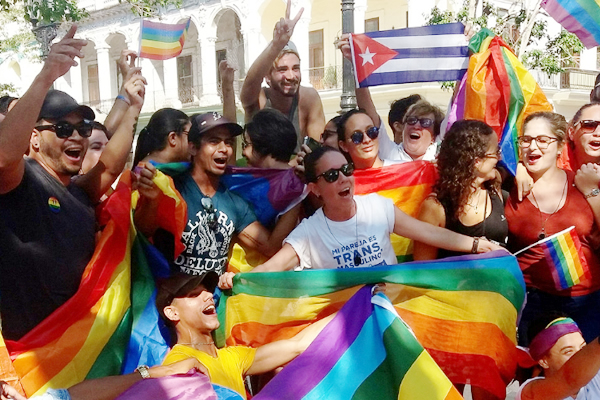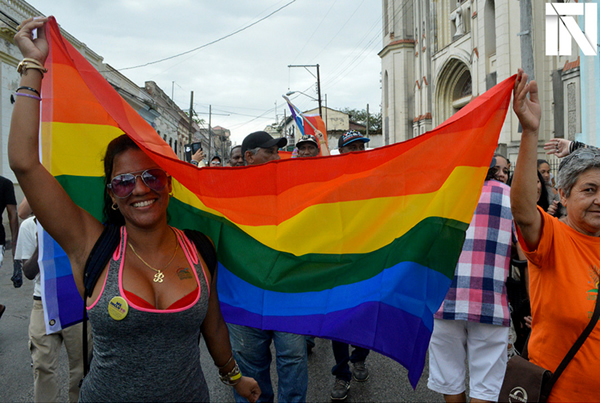
Kathmandu (Pahichan) November 30 – While churches oppose same-sex marriage and the National Center for Sex Education (CENESEX) fails to take a strong public position, Cuban LGBTI+ activists who are less organized than religious institutions are forced to campaign on different platforms.
At three in the afternoon on Oct. 27 at the intersection of Prado and Malecón Streets in Havana, a kiss-in (or besuqueo as the organizers called it) was planned in support of same-sex marriage. A few hours earlier more than 600 people had confirmed their attendance and the event had been shared hundreds of time on social media. The slogan called to “take kisses out of the closet.”
During the kiss-in Proyecto Abriendo Brechas de Colores (ABC) – LGTBI (Opening Color Gaps Project), a group seeking to “generate spaces for dialogue between religious and social discourses regarding women’s and LGBTIQ+ people’s rights,” planned to hand out leaflets on religious fundamentalism, as well as posters and stickers about sexual diversity and gender.
ABC was going to project videos produced during the All Rights for All Families campaign. The most creative kisses would also be photographed. They were going to raise the flag for diversity in the Prado area.
However, one day before the planned event ABC publicly cancelled the kiss-in because they had not received state permission to take to the streets.
Despite the cancelation a flash mob took over the intersection of Prado and Malecón.
Event organizers and other activists connected with CENESEX also showed up, and they kissed.
The kiss-in had no major impact: There were 30 people instead of the hundreds planned.
The event’s cancelation and the promoters’ hesitancy were criticized on social media by several activists. The poet Norge Espinosa summed up his disappointment like this: “True activism is done with daring, with an urgent willingness to go beyond the permitted limits, or it isn’t done.”
Ironically, days before ABC cancelled the kiss-in the Mariano Methodist Church gathered approximately 3,500 members of its flock to show their opposition to same-sex marriage, according to a publication on their Facebook page. They held a mass event without anyone’s permission.
So far Cuban churches have held a firm position against same-sex marriage and “the ideology of gender” on their institutional websites and social media.
However, their activism has also transcended the borders of the virtual world. Parishioners have distributed posters and stickers across the country defending the “original design of the family, as God created it.” They have also taken to the streets around their churches to protest. If that was not enough they have also “published” their message in the El paquete seminal or The Weekly Package, a Cuban alternative to the Internet that proves a terabyte of data for readers.
Now they want to go even further. Reverend Alida León, president of the Cuban Evangelical League, confirmed to Tremenda Nota that 20 different denominations have collected signatures against Article 68. “We don’t have anything against homosexuals but we demand that the concept of marriage be maintained as God created it.”
Indeed, on Nov. 13, more than a dozen Christian denominations published a letter sent to the Constitutional Reform Commission at the Communist Party’s Central Committee. The 13 churches that signed the document stated that they had collected almost 180,000 signatures against modifying the concept of marriage in the new constitution.
If Article 68 is kept in the draft constitution, the Christian community could vote against it in the next referendum. In the text “Article 68: Evangelicals, Catholics, the LGBTI movement and the smoke screens” the intellectual and activist Alberto Abreu Arcia argues that León Báez, one of the Cuban evangelical Church’s leaders, declared, “If marriage is not modified in the draft constitution, we will all vote against it.”
According to Instituto Patmos in 2017, 10 percent of the Cuban population stated they were evangelicals, while 35 percent considered themselves to be nominally Catholic. The Christian denominations are organized and they have a presence throughout Cuba. They have places to meet and mechanisms to communicate directly with the state. This puts independent activism on a back foot in this debate.
Many defenders of LGBTI+ rights in Cuba have had to follow a script written by CENESEX. In May they held a procession to a conga beat and then they went back to social networks, where reports, messages and campaigns amass. They cannot reach the streets without the government’s consent.
“In the interest of transforming the current state of affairs I think, like many other activists, that the LGBTI+ agenda should be promoted alongside civil and political rights so that collectives can become legal, unite, have spaces to meet and make use of mechanisms for participating and impacting on politics,” Cepero argues.
The founder of the debate platform “Constructing an Agenda for Sexual Diversity in Cuba” believes that the first step for defenders of LGBTI+ rights is taking the risk of grabbing public space. “The church put up its posters and nothing happened. What are we afraid of?”
However, during the debates on the constitution a sector of Cuban activism has lagged behind the churches, confident of the state’s role as guarantor of rights.
“We have a powerful legacy of inactivity, of fear, often because they have not allowed us to make our own way,” states activist and lawyer Lidia Romero. “We have reached an important moment to demand our rights and it seems like we don’t know what to do, or how to organize ourselves.”

Only on May 17 — International Day Against Homophobia, Transphobia and Biphobia — does the government, through CENESEX, permit activists, LGBTI+ people or supporters of sexual rights to march. (Photo by Yariel Valdés González)
Some activists believe that the approval of Article 68 is a foregone conclusion, so they think it is a waste of time reacting to the religious groups. In his blog, Paquito el de Cuba, journalist Francisco Rodríguez Cruz argued that they shouldn’t be afraid that, “The matrix of conservative opinion of some churches can impose itself on the rest of society.”
The blogger explains that the results of the public consultation will not be based on the number of signatures collected by churches or the number of arguments against Article 68, “Rather by analyzing the pertinence of each proposal that emerges from the debate, by the commission writing the draft constitution and Parliament, which will approve the final text before the referendum.”
Rodríguez Cruz’s opinion is supported by statements made by State Council Secretary Homero Acosta Álvarez. Last Oct. 17, during the inauguration of the International Congress ABOGACÍA 2018, the lawyer said, “Rights cannot be the perpetual slave to social backwardness, even when in the moment it could lead to clashes with parts of the social spectrum. A mission to transform must also promote development.”
Over the last few weeks some activists have started to circulate short videos on social networks where LGBTI+ people (and others) show their support for Article 68 of the draft constitution.
68th Pages, Acepto, For Same-Sex Marriage in Cuba, Proyecto Abriendo Brechas de Colores – LGTBI [ABC], Constructing an Agenda for Diversity in Cuba and the Metropolitan Community Church in Cuba are heading different campaigns on social networks. Many others are also joining in from their personal profiles or blogs.
However, the proposals and campaigns generated on these digital platforms do not go beyond a virtual space in a country where the majority of people are still not online.
A few months ago, on May 11, 20 Cuban intellectuals and activists published a detailed agenda for LGBTI+ rights in Cuba. The document, the first of its kind in the country, includes 63 specific demands and is divided into two large sections: legislative and political measures, plans and strategies. All of those signing it were members of civil society.
Some of the signatories are activists who are looking for alternative ways to channel their demands that are independent of the state and CENESEX.
CENESEX “is an institution that excludes those that don’t agree with their political ideas. They also do not they share their work progress. They just ask us to trust that they ‘are working,’ without providing any more information. They don’t treat us as equals or as members,” adds Romero.
Recently activist Sandra Álvarez Ramírez, formally CENESEX’s webmaster and member of the editorial board for the magazine Sexología y Sociedad (Sexology and Society) asked about the cancelation of the kiss-in. CENESEX responded via Facebook that, “’Real journalists don’t receive instructions from Berlin” referring to the fact that the Cuban psychologist lives in Germany.
For many activists the current panorama is made worse by the lack of coherence within the Cuban LGBTI+ movement. “If you don’t have spaces to meet, or to take action, or an institution that represents you as a whole, and you can’t even legally associate, then there is no unified work. But we must overcome these limitations,” states Romero.
Less united, and lagging behind the churches, activists are starting to quietly leave networks, they are starting to realize that they need to rebuild the state, institutions and the parts of society refusing to let all people have all rights.
Jimmy Roque Martínez does not believe that those sympathetic to the cause of sexual rights should quietly wait around for the results of the constitutional referendum. “Along with the life stories and opinions that started to circulate on social networks and the pages created, we are also going to organize new kiss-ins, but these won’t be canceled” he promises.
Source : washingtonblade
Copyright © All right reserved to pahichan.com Site By: Sobij.